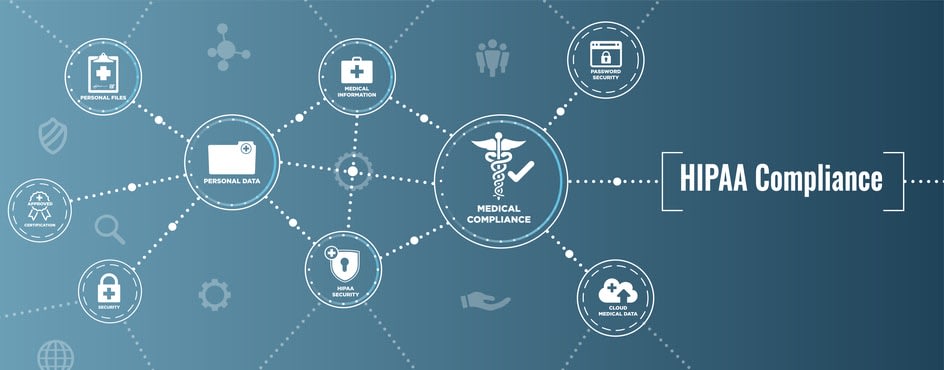HIPAA Compliant Hosting Checklist
- What is HIPAA Compliant Hosting?
- HIPAA Compliant Hosting Checklist

In this guide, we outline the essential requirements for HIPAA compliant servers and how Liquid Web helps fulfill these necessities.
What is HIPAA Compliance?
HIPAA, or the Health Insurance Portability and Accountability Act of 1996, was passed by Congress to protect sensitive user information related to health insurance. This act helps to reduce health care fraud and mandates a standard for handling confidential healthcare information for consumers and businesses.
HIPAA compliance protects this sensitive information and specifies proper guidelines and standards for handling health insurance data. HIPAA also establishes rules for handling, administering, and maintaining electronic servers as well as the hosting of this Protected Health Information. Read more about our HIPAA compliant hosting here.
Key Terms and Important Information:
- HIPAA - Health Insurance Portability and Accountability Act of 1996
- PHI – Protected Health Information
- Access Control – To limit who can log in or access sensitive PHI data. Access control helps provide accountability for authorized usage and access to servers with confidential information. HIPAA requires that all users are uniquely identifiable and that the server hosting PHI data is only accessible to specifically authorized users and entities.
- Audit Control – To log and record hardware, software and procedural work done to maintain and repair HIPAA compliant servers and data centers. HIPAA requires accurate and uniquely accountable logs for the type of work performed, what was accessed, and by whom. This notation is closely related to access control by limiting maintenance to authorized and uniquely identifiable persons or entities, but also refers explicitly to logging any maintenance of physical hardware or server software.
- Facility Access Control - To limit physical access to the data center from unauthorized or unaccountable persons. This control makes sure that only designated workers have access to physical servers containing PHI. Liquid Web's data centers are HIPAA compliant and properly limit access to all servers.
Firewalls and User Identification
To be HIPAA compliant, you must have firewalls in place. Most of the time, compliant hosting will implement hardware, software, and application level firewalls to protect the server from unauthorized users. This security applies to Access Control as well as Transmission Security, which protects PHI from unauthorized access.
HIPAA regulations state the firewalls must be system-wide. The firewall implementations are part of the requirements for limiting access to personal information stored on a VPS server or dedicated server. Firewalls that are properly set up will limit or prevent accessibility from anyone who should not have access, often using explicit whitelists and blacklists. This setup prevents unauthorized employees, clients, or hackers logging into servers with sensitive data.
To be allowed through the firewall your users must have a uniquely identifiable username or identification that has been explicitly allowed access permission. At Liquid Web, our networking team is at hand to secure your server with hardware firewalls, while our support team is ready to protect sensitive PHI data with software firewalls.
Encrypted VPN (Virtual Private Network)
HIPAA compliance requires that remote access to the server through an encrypted VPN tunnel. This VPN protects data entering into the tunnel with an encrypted session that lasts only as long as the session exists. Work done between the remote workstation and the server is protected from interception via this encryption. At Liquid Web, our VPN services are automatically encrypted to protect your data.
Multi-Factor Authentication
Password management is an essential part of HIPAA compliance. Safeguarding passwords and isolating them to identifiable users is integral to the protection of sensitive data. Using multi-factor authentication is highly recommended for this process.
Multi-Factor Authentication forces users logging into the secured server system to use both a password and another form of authentication, such as a mobile device, verifying their identity for granting intended access. Authenticating makes it much more difficult for hackers and unauthorized users to use stolen or brute force-acquired login credentials to access the server, as the user will have to do a secondary verification from a device that is unique to them.
Many companies utilize Google Authenticator which allows your users to have a phone app to use as their secondary verification method. Multi-Factor Authentication falls under Access Control.
Private Hosting and Physical Safeguarding
If you want to be HIPAA compliant, your server cannot be on shared hosting. You must have a server that cannot be accessed by any other business or entities, which means it needs to be private or dedicated to your business. This isolated includes requiring a private IP address that is not used by another entity.
By running on shared hosting, you are breaking HIPAA compliance by allowing non-authorized users access to the server. Hosting with Liquid Web gives you a private, dedicated HIPAA server strictly used by your business.
HIPAA requirements for limiting user access and having proper authentication. The server itself must also exist within a HIPAA compliant data center. Liquid Web has a high-security, HIPAA compliant data center that all of our clients are hosted within, falling under Facility Access Control.
SSL Certificates
An SSL certificate must protect any part of your website where sensitive information can be accessed. An SSL provides end-to-end encryption for the accessed data and logins used, to further protect access to the server. HIPAA defines PHI as Protected Health Information and anywhere that a user can access PHI must be protected with SSL.
Here is more information about how SSL's work.
Business Associate Agreement (BAA)
A BAA is necessary for HIPAA compliant hosting as it designates the role of the hosting company and defines responsibility for different parts of HIPAA compliance. It does not resolve your business of its HIPAA related duties, but it represents the roles that your business and the hosting company partake.
This Business Associate Agreement allows a hosting company the necessary access to servers to maintain them, while still preventing any other businesses’ unauthorized access to Protected Health Information.
Offsite Backups
HIPAA compliance requires that all Protected Health Information must have an exact backup ready for restoration. These backups must also be located offsite and not on your server for recovery in the event of disaster or server malfunction. At Liquid Web we have two solutions for this, Acronis cyber backups and DPM (Data Protection Manager) Backups.
By having an offsite backup, you are protecting the Protected Health Information and ensuring that no data loss will occur on restoration. Fully restoration is often achieved with continuous backups notating any changes of information on the server.
Read more about our different backup services here.
Proper Data Disposal
To be HIPAA compliant, the appropriate methods are necessary for getting rid of hardware. This disposal usually requires that the data be wiped entirely and destroyed in a manner that will not allow for restoration.
Data destruction is typically peer-reviewed and documented to state precisely the method of destruction. This process is to prevent any future use of the hardware from being able to recover sensitive PHI data. Often called Integrity Control it ensures that data is properly altered or destroyed.
Records and Logging
All logins and maintenance must be fully documented. Any repairs on the physical servers must be logged, especially those related to the security of the server and who logs in to servers for software maintenance and reviews and applies to Audit Control.
At Liquid Web, all of our work is logged and appropriately recorded with HIPAA compliant standards.
HIPAA Compliant Hosting in Review
HIPAA compliance is an integral part of your business. While it can be confusing, our technicians at Liquid Web can ensure you that your Protected Health Information is appropriately handled and follows HIPAA compliant standards. While we have only reviewed a portion of the requirements of HIPAA compliance, feel free to reach out to our HIPAA Specialists for more information about how we handle our data centers and servers.
Related Articles:

About the Author: Mike Sherman
Mike Sherman was formerly one of our Helpful Humans at Liquid Web and worked on the Windows Enterprise Department. He has over 10 years of technology experience and a wealth of SEO and online marketing knowledge. He now supports IT infrastructures for mid-range companies as a Mid-West MSP.
Our Sales and Support teams are available 24 hours by phone or e-mail to assist.
Latest Articles
In-place CentOS 7 upgrades
Read ArticleHow to use kill commands in Linux
Read ArticleChange cPanel password from WebHost Manager (WHM)
Read ArticleChange cPanel password from WebHost Manager (WHM)
Read ArticleChange the root password in WebHost Manager (WHM)
Read Article



